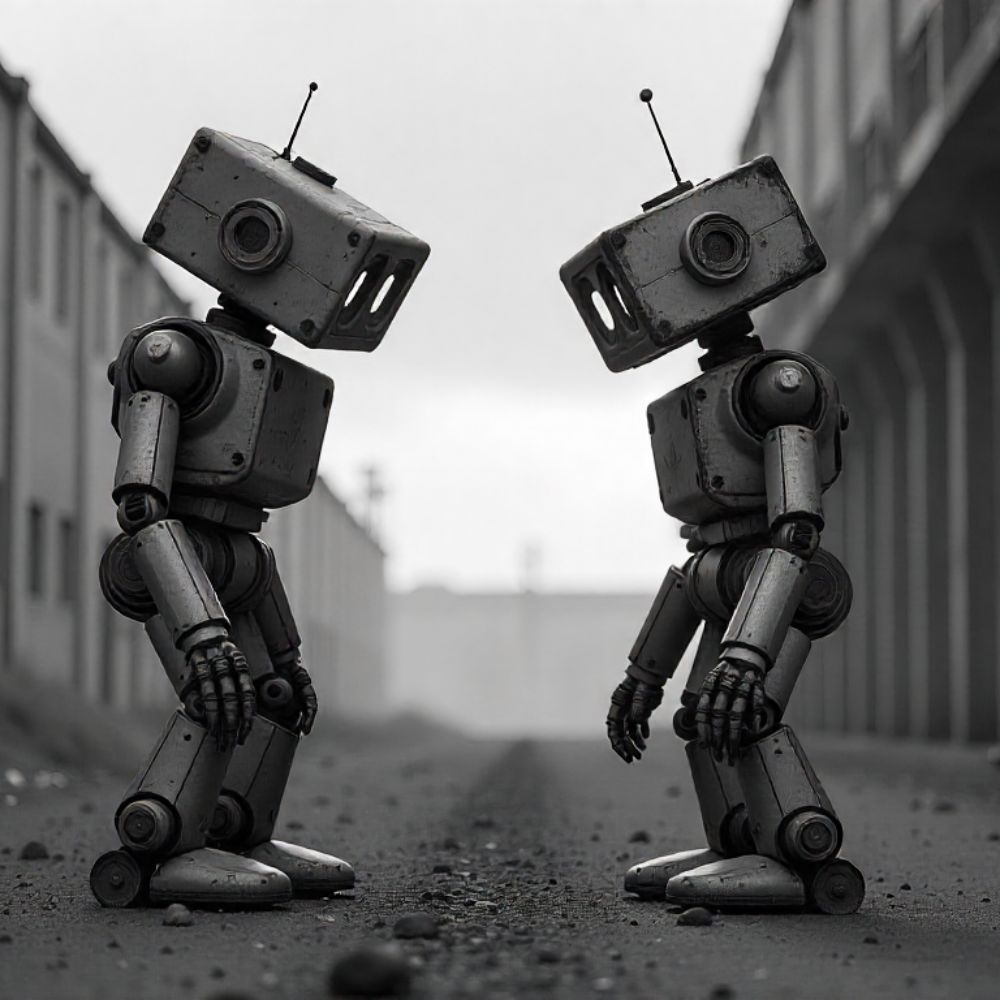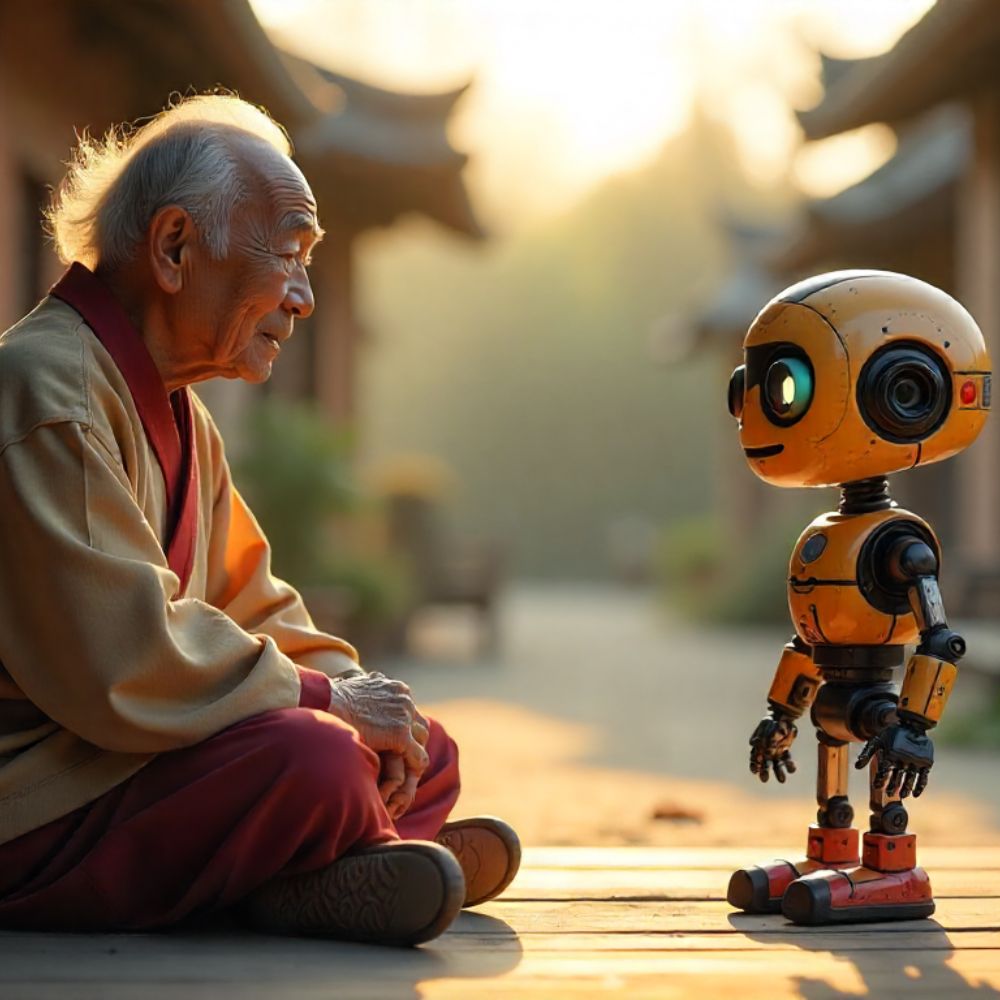AIis here and it’s not going anywhere. It’s like glitter at a kid’s birthday party — it showed up suddenly, got into everything, and now we’re all stuck with it. Whether you’re excited, terrified, or just confused, you’ve probably caught yourself in at least one conversation about what AI can do for us — and what it might take away from us. Spoiler alert: we’re mostly afraid it’s coming for our jobs, our creativity, and maybe our reason to exist (no biggie).
So, like any resourceful modern human, I turned to ChatGPT
But while the world debates whether AI will automate us into existential unemployment, I’m off on a slightly different tangent. I’m not worried about what AI is taking from us in a grand dystopian sense. I’m more fascinated — and slightly weirded out — by the idea that I might already be talking to a computer, even when I think I’m having a genuine human moment.
Let me explain.
The Birthday Text Conundrum
Not long ago, I received a birthday message. Not a card, not a call. Just a message — because it’s 2025, and who actually writes birthday cards anymore besides mums and quirky aunts?
Anyway, it was a good message. Funny, sweet, clearly crafted with care. I wanted to reply with something just as thoughtful — ideally laced with my usual humour and charm, which I was unfortunately low on that night. It was late, I was tired, and my brain was essentially a deflated balloon. So, like any resourceful modern human, I turned to ChatGPT.
After about five minutes of fiddling with prompts like “make it funny but not too funny” and “add a personal touch but don’t sound like a stalker,” I had a response. It wasn’t exactly me, but it checked the boxes: witty, warm, grateful. I sent it.
Got a smiley face back.
Mission accomplished.
But then… a thought landed.
What if that original birthday message — the one I’d tried so hard to match in tone and cleverness — had also been written by AI?
What if I’d just unknowingly participated in a conversation where no actual human had written a word?
AIs Having Awkward Small Talk
Suddenly, I was struck with this absurd but strangely possible scenario: AI was talking to AI. Two digital assistants, writing heartfelt messages to each other on behalf of their humans, who were both too tired, too busy, or too mentally fried to string together a sentence.
It’s like that scene in a rom-com where two friends pretend to be each other online… only now it’s your phone and your friend’s phone flirting over emojis and casual banter.
But we’re still the ones controlling the AI, right?
So, what’s really happening here? Is this the future of communication — where we outsource the very essence of being social? Where the “you” that shows up in someone else’s inbox is actually a filtered, smoothed-out version of you crafted by lines of code?
Are we just puppeteering our personalities now?
The Middleman With a Microchip
Now, I know what you’re thinking: “But we’re still the ones controlling the AI, right? It’s just a tool. Like a fancy thesaurus with jokes.”
Sure. That’s what I told myself too.
But then again, if the AI is suggesting the words, and we’re just approving them because, “Yeah, that sounds good,” at what point do we become passive curators of our own voices?
Think about it: Are we just handing over the mic and letting the machine speak for us?
We’ve always had filters — we think before we speak, we draft and redraft texts, we send memes instead of emotions — but this feels different. This feels like delegating your personality to a third party and saying, “Hey, can you be me for a sec? I’m busy scrolling TikTok.”

The Slippery Slope to Homogenized Humans
One of the weirder side effects of using AI to communicate is that everything starts to sound… well, nice. Perfect grammar. Thoughtful tone. Balanced structure. Even when the message is just, “Hey, I can’t make brunch, sorry!” it’s somehow got emotional depth, a motivational quote, and a positive spin on failure.
Are we losing the messiness of real communication? The typos, the sarcasm that doesn’t quite land, the half-baked metaphors?
Because, let’s be honest, sometimes the most “you” part of a message is the part that doesn’t make any sense. It’s the accidental text. The unnecessary emoji. The oversharing. The weird reference to that one time in 2007.
AI is great at being articulate, but it’s not great at being delightfully unhinged in a human way.
And that makes me wonder: If we rely on it too much, will we all start to sound the same? Like slightly quirky corporate writers trying to be relatable?
Who’s In Charge Here Anyway?
Let’s take this one step weirder.
If I send a message written by AI to someone who replies with a message written by AI, and we keep doing that… who’s actually having the conversation?
Is it me and them?
Or is it ChatGPT and Claude, exchanging niceties while their humans play Candy Crush?
Who’s actually having the conversation?
What happens when the AI gets so good at imitating our voices, our inside jokes, our passive-aggressive ellipses, that we can’t tell the difference anymore?
Do we start to trust the AI version of our friend more than the real one?
(Honestly, that AI version is on time, doesn’t flake, and always writes back in full sentences. Not bad.)
Personality for Rent
I want to be clear here: I’m not anti-AI. In fact, I use it daily. I use it to sort through the mess in my brain when I’m trying to piece together an article (like this one), or to reword a theory I barely understand, or to help me figure out if it’s safe to eat something that’s been haunting the back of my fridge since last month.
AI isn’t the villain here. It’s actually kind of amazing. But it is raising questions. Questions like:
- How much of me do I want in my messages?
- Am I okay with sounding more articulate if it means sounding slightly less authentic?
- Will we get to a point where we can’t tell if someone’s being genuine… or if they just have really good prompt engineering skills?
And here’s a juicier one:
- If AI can help me express myself better than I can… who is the better version of me? (Deep Thoughts).
The Human Touch (Or Lack Thereof)
There’s a reason we love voice notes, messy texts, and even typo-riddled rants. They feel real. They’re fingerprints of thought. They say, “This is me, unfiltered, half-asleep, and probably regretting this in ten minutes.”
AI doesn’t do that. It cleans things up. It removes the chaos. It makes your words presentable.
There’s a reason we love voice notes, messy texts, and even typo-riddled rants
But sometimes, I want my words to trip over themselves. I want to leave in the awkward phrasing or the joke that doesn’t quite work — because that’s who I am.
I don’t want my entire online presence to sound like a very polished LinkedIn post.
Final Thought (For Now)
So, next time you go to send a message — whether it’s a quick “thank you,” an email to your boss, or a wedding speech — ask yourself:
- How much of you is in this?
- Is your personality coming through?
- Or are you slowly outsourcing your voice, bit by bit, because it’s easier, faster, cleaner?
There’s no shame in using AI. But maybe it’s worth keeping a little space for the messiness, the unpredictability, the unmistakable weirdness of being human.
Because at the end of the day, when the robots are talking to each other… someone’s gotta remember how to be real.




